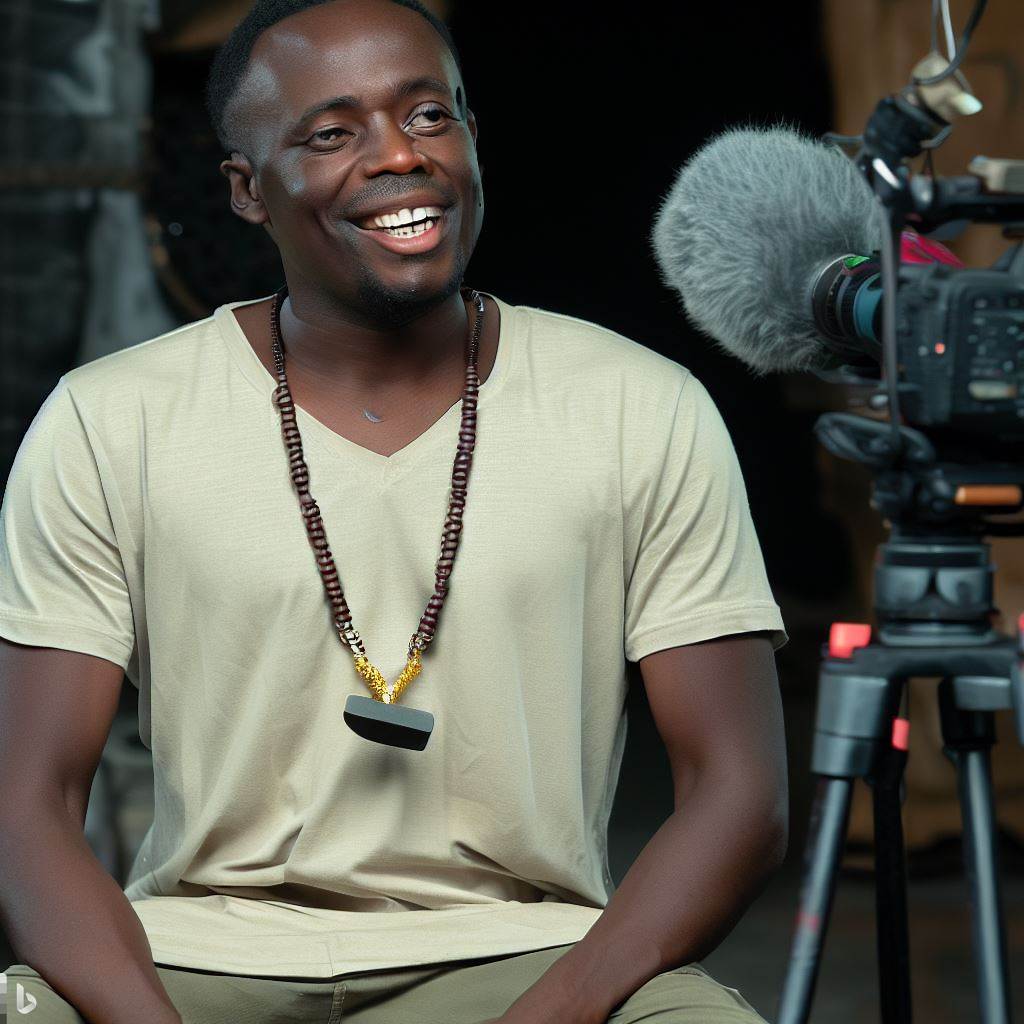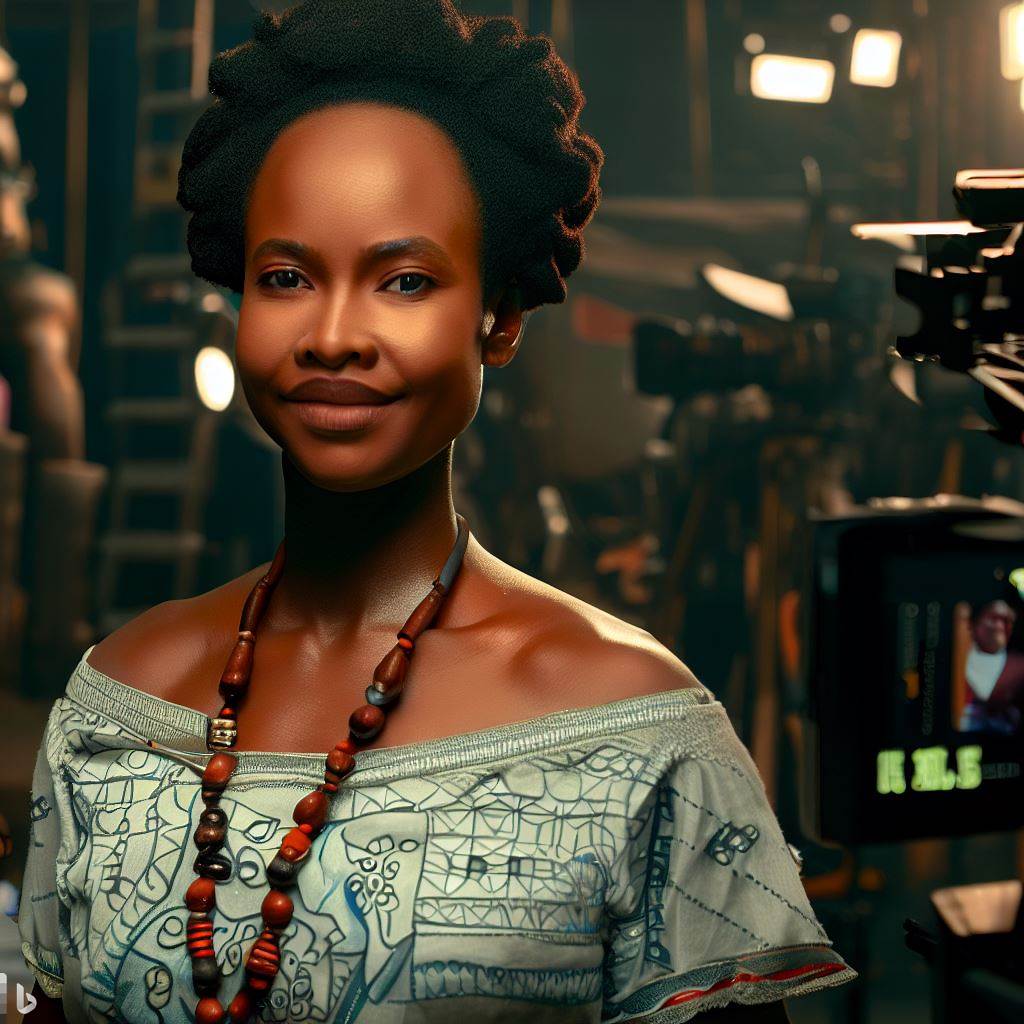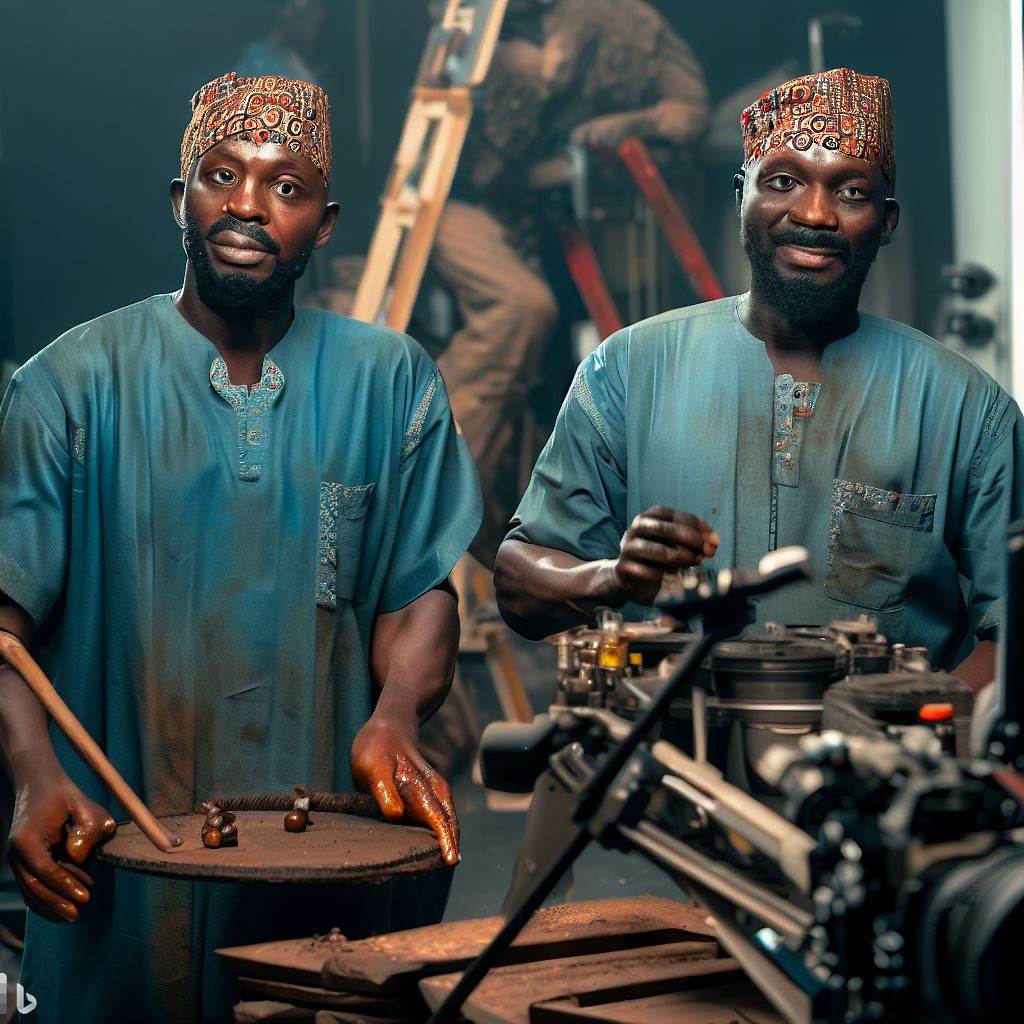Introduction
The Nigerian film industry, also known as Nollywood, is one of the largest film industries in the world, producing thousands of movies each year. This post is about Interviews with Foley Artists in Nigeria.
Foley art, a technique of adding sound effects to films during post-production, plays a crucial role in enhancing the overall cinematic experience.
By creating and manipulating sounds that are synchronized with the visuals, foley artists bring authenticity and richness to the film’s audio.
Foley art is pivotal in filmmaking as it helps to create a more immersive and believable world for the audience.
It involves re-creating sounds that are recorded separately from the film’s visuals, such as footsteps, door slams, gunshots, and even the rustling of clothes.
The artistry lies in using various objects and techniques to mimic these sounds in a way that complements the on-screen action.
Foley artists in Nigeria’s film industry play an essential role in elevating the quality of the movies produced.
Their skills and creativity contribute to the success and impact of Nollywood films, making them more engaging and realistic.
Through their work, these artists bring life to the characters, environments, and situations portrayed on screen.
Let’s dive into Nigeria’s foley art: Discover artist challenges, techniques, equipment, and success stories in film.
Stay tuned to discover the behind-the-scenes magic that makes Nollywood films come alive through sound.
Background on Foley Artistry in Nigeria
The Nigerian film industry, also known as Nollywood, has seen a significant rise in the use of Foley artistry in recent years.
Foley artistry involves the creation and recording of sound effects for films, enhancing the overall audio experience for the audience.
With the increasing demand for high-quality films in Nigeria, filmmakers have recognized the importance of sound design and Foley artistry in creating immersive storytelling.
This has led to a surge in the number of Foley artists in the industry.
However, despite the growing popularity of Foley artistry, there are several challenges that artists in Nigeria face.
Firstly, there is a lack of access to proper equipment and resources, making it difficult for artists to produce high-quality sound effects.
Additionally, the lack of recognition and support for Foley artists in the industry poses a challenge.
Many filmmakers in Nigeria are still unaware of the value that Foley artistry adds to their films, and as a result, they often overlook the need for professional Foley artists.
Despite these challenges, there are several successful Foley artists in Nigeria who have made a name for themselves in the industry.
In this section, we will have the opportunity to interview some of these talented individuals and gain insights into their experiences and achievements.
Kolade Morakinyo
Adeola Johnson is a renowned Foley artist in Nigeria, with over a decade of experience in the field.
he has worked on numerous blockbuster films and is known for her attention to detail and ability to create realistic sound effects.
During the interview, Adeola will share her journey as a Foley artist in Nigeria, highlighting the challenges he faced along the way.
he will also provide valuable advice for aspiring Foley artists who wish to pursue a career in the industry.
Rodney Abia
Ibrahim Ahmed is another successful Foley artist in Nigeria who has made a significant impact in the industry.
His work is characterized by its creativity and innovation, pushing the boundaries of traditional sound design.
In the interview, Ibrahim will discuss the evolution of Foley artistry in Nigeria and how he has been able to adapt to the changing landscape.
He will also shed light on the importance of collaboration between Foley artists and filmmakers for the overall success of a film.
Bisi Peters
Chioma Okafor is a rising star in the Nigerian film industry, known for her exceptional talent in Foley artistry.
He has worked on several critically acclaimed films and has been praised for her ability to bring scenes to life through sound.
In the interview, Chioma will share her experiences as a young Foley artist in Nigeria, highlighting the opportunities and challenges he has encountered.
he will also discuss the importance of mentorship in nurturing the next generation of Foley artists.
In the end, Foley artistry has become an integral part of the Nigerian film industry, enhancing the overall audio experience for viewers.
Despite the challenges faced by Foley artists in Nigeria, there are several successful individuals who have carved their own path in the industry.
By learning from their experiences and insights, aspiring Foley artists can gain valuable knowledge and inspiration to pursue their passion.
Read: Music Directors’ Contribution to Nigerian Cultural Heritage
Interview 1: Kolade Morakinyo
In this section, we will look at an interview with Kolade Morakinyo, a successful foley artist in Nigeria’s film industry.
We will explore his journey, experience, creative process, notable films, challenges faced, and tips for aspiring foley artists.
Introduction: The First Successful Foley Artist in Nigeria
Kolade Morakinyo is widely recognized as the first successful foley artist in Nigeria’s film industry.
With his immense talent and dedication, he has made a significant impact on the art and craft of sound design in Nigerian films.
Overview of Kolade Morakinyo’s Journey and Experience
Kolade Morakinyo began his journey as a sound engineer before discovering his passion for foley art.
He honed his skills through rigorous training and years of hands-on experience in the film industry.
His dedication and commitment have brought him immense success and recognition.
In-depth Questions about Kolade Morakinyo’s Creative Process, Techniques, and Tools
During the interview, we had the opportunity to delve into Kolade Morakinyo’s creative process, techniques, and the tools he uses.
He emphasized the importance of observing real-life actions and applying them to create authentic sounds. He employs a wide range of tools, from everyday objects to customized equipment.
Examples of Notable Films Kolade Morakinyo has Worked On and the Impact of His Foley Work
Kolade Morakinyo’s foley work has left a lasting impact on numerous notable films in Nigeria.
Some examples include “The Wedding Party,” “October 1,” and “King of Boys.” His attention to detail and ability to bring scenes to life with sound have enhanced the overall cinematic experience for audiences.
Insights into the Challenges Faced and How Kolade Morakinyo Overcame Them
Like any artist, Kolade Morakinyo faced several challenges along his journey. One major hurdle was the lack of awareness and recognition of foley art in Nigeria.
However, his determination and belief in his craft enabled him to overcome these obstacles and pave the way for other aspiring foley artists.
Tips and Advice for Aspiring Foley Artists in Nigeria
Aspiring foley artists in Nigeria can learn valuable lessons from Kolade Morakinyo’s experience. He advises them to be passionate, dedicated, and willing to constantly learn and improve their skills.
He also emphasizes the importance of networking and building strong relationships within the industry.
In fact, Kolade Morakinyo’s journey as a successful foley artist in Nigeria’s film industry is truly inspirational. His creativity, techniques, and dedication have elevated the standard of sound design in Nigerian cinema.
Aspiring foley artists can take inspiration from his story and strive for excellence in their own careers.
Read: Nollywood and Animation: An Unfolding Narrative

Delve into the Subject: DJ Equipment Essentials: The Nigerian DJ’s Starter Kit
Interview 2: Rodney Abia
Introduction to Rodney Abia: A Master of Foley Art in Nigeria
Rodney Abia is a highly successful foley artist in Nigeria’s film industry, known for his extraordinary talent and contribution to the world of sound effects in movies.
With a career spanning over two decades, Abia has achieved remarkable feats and establihed himself as one of the best foley artists in the country.
Abia’s career and achievements in the film industry
Throughout his illustrious career, Rodney Abia has worked on numerous blockbuster Nigerian films, enriching them with his exceptional foley art.
His ability to create realistic sounds that bring movies to life has earned him recognition and accolades within the industry.
Abia’s dedication and attention to detail have made him a sought-after talent among directors and producers.
Rodney Abia’s foley art techniques and artistic choices
Abia’s foley art techniques are deeply rooted in his passion for perfection. He meticulously studies each scene to identify the sounds that need to be enhanced or created from scratch.
By using a wide range of props and equipment, Abia meticulously recreates sounds that perfectly match the actions and movements on the screen, ensuring an immersive cinematic experience for the audience.
Exemplification of Abia’s work on popular Nigerian films
One of the noteworthy films Abia worked on was “The Sound of Destiny,” a critically acclaimed drama that showcased his exceptional talent.
In one particular scene, where the protagonist walks through a crowded market, Abia’s carefully crafted sound effects captured the hustle and bustle, bringing the audience right into the protagonist’s shoes.
Obstacles encountered and how Rodney Abia overcame them
Like any artist, Abia faced several challenges along his journey. Limited resources and tight budgets often posed obstacles for him to create the desired sounds.
However, his determination and creativity consistently led him to find innovative solutions and alternatives.
Abia’s resilience and adaptability have been instrumental in his success as a foley artist.
Valuable suggestions and guidance for aspiring foley artists in Nigeria
For aspiring foley artists in Nigeria, Abia advises perseverance and passion.
He emphasizes the importance of constantly honing one’s skills, seeking opportunities for growth, and adapting to new techniques and technologies.
Abia also encourages networking with industry professionals and staying updated with the latest trends to create a niche in the competitive field of foley art.
In essence, Rodney Abia’s journey as a foley artist in Nigeria’s film industry is an inspiring tale of dedication, talent, and perseverance.
His exceptional abilities and contributions have made him a household name in the industry.
Through his innovative foley art techniques, Abia has enriched numerous Nigerian films, captivating audiences and enhancing the overall cinematic experience.
Aspiring foley artists can learn valuable lessons from Abia’s career and apply his guidance to establish their own successful journeys in the field.
Read: Challenges and Solutions for Nigerian Foley Artists: A Discussion
Interview 3: Bisi Peters
Introduction to the third successful foley artist in Nigeria
Meet Bisi Peters, a renowned foley artist who has made significant contributions to Nigeria’s film industry.
With an impressive portfolio spanning over two decades, Peters is considered one of the best in the country.
Their experience in the Nigerian film industry
Peters reminisces about the early days, recalling the challenges and hardships faced as a newcomer in the Nigerian film industry.
Despite the obstacles, Peters persevered and carved a niche for themselves as a sought-after foley artist.
Their approach to foley artistry and sound design
Peters believes in paying attention to detail and immersing themselves in the world of the film.
By carefully analyzing the script and understanding the director’s vision, Peters creates sounds that enhance the overall cinematic experience.
Significant contributions to well-known Nigerian movies
One of Peters’ most notable works includes the critically acclaimed movie “The Sound of Lagos,” where they expertly recreated the bustling sounds of the city, bringing the scenes to life.
Their impeccable work garnered them multiple awards and recognition.
The barriers faced during their career and strategies for success
As a foley artist in Nigeria, Peters faced numerous challenges, including limited resources and the perception that their role was secondary.
However, they overcame these barriers through determination, continuous learning, and building strong relationships with industry professionals.
Inspiration and recommendations for emerging foley artists in Nigeria
Peters believes in the power of passion and hard work.
They encourage emerging foley artists to pursue their dreams relentlessly, seek mentorship, and collaborate with fellow artists to further their skills and establish themselves in the industry.
Overall, Bisi Peters’ journey as a foley artist in Nigeria’s film industry is a testament to perseverance and dedication.
Through their innovative approach to sound design and unwavering commitment to their craft, Peters has left an indelible mark on Nigerian cinema.
Read: Creating Authentic Sounds: Tips from Top Nigerian Foley Artists
Conclusion
The interviews with successful foley artists in Nigeria’s film industry have hed light on the importance of foley artistry in enhancing the overall cinematic experience.
These talented individuals have shared invaluable insights into their creative processes, the challenges they face, and the ways in which they contribute to the success of Nigerian films.
Through these interviews, we have learned that foley artists play a crucial role in adding realism and depth to on-screen visuals, making the audience feel more connected to the story.
They skillfully create sound effects that heighten emotions, amplify action sequences, and bring authenticity to various scenes.
Furthermore, the interviews have provided aspiring foley artists with encouragement to pursue their passion in the Nigerian film industry.
Despite the challenges they may encounter, the success stories of these talented artists serve as a testament to the rewarding nature of this craft.
Their achievements remind us that with dedication, hard work, and talent, aspiring foley artists can make a meaningful impact in the industry.
To sum it up, foley artistry is an essential component of the Nigerian film industry. It not only enriches the cinematic experience but also offers aspiring artists an avenue to showcase their creativity.
The interviews with successful foley artists have given us valuable insights, inspiring us to appreciate the art form and encourage others to pursue their dreams in this field.




